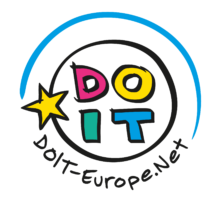Presentation of Innovation Projects: Smart Accessories for Attractive Bike Mobility
How can bicycle mobility become more attractive? Together with experts from the European initiative “DOIT” (led by Salzburg Research), students of BHAK/BHAS Hallein developed innovative, sustainable ideas with the help of digital technologies. On Monday, the youngsters present the ideas they have created and their own prototypes.
October 21, 2019, 2 pm to 3.30 pm
BHAK/BHAS Hallein
Neualmerstraße 28, 5400 Hallein
(Follow the signs)
Program
Moderation by the students:
- Welcome by Mr. Mag. Werner Huber, BHAK/BHAS Hallein
- Greetings from Mrs. AL Mag. Katharina Kiss, BMBWF
- Background to the project DOIT and the cooperation with BHAK&BHAS Hallein – a short introduction by Sandra Schön (Salzburg Research) and Prof. MMag. Elke Austerhuber (BHAK/BHAS Hallein)
- Short presentation of the prototypes by the pupils
- Expert statements on the developments
- Petra Stabauer, Salzburg Research, Project Manager SimpliCITY
- Willi Grundtner, Grundtner GmbH
Many thanks to all experts mentioned above as well as to Stefan Wallinger from the bicycle service Wallinger, who supported the students in the workshop with words and deeds.
No registration required, we look forward to seeing you!
Program as PDF: Invitation_final presentation (in German)
DOIT – Entrepreneurial Skills for Young Social Innovators in an Open Digital World
 The European research initiative “DOIT” under the direction of Salzburg Research aims to inspire pupils (6-16 years) for social innovation and impart entrepreneurial thinking, know-how and skills. For this purpose, the DOIT program and learning materials are developed and tested on a scientific basis, with which it is possible to develop new impulses for creative thinking and acting.
The European research initiative “DOIT” under the direction of Salzburg Research aims to inspire pupils (6-16 years) for social innovation and impart entrepreneurial thinking, know-how and skills. For this purpose, the DOIT program and learning materials are developed and tested on a scientific basis, with which it is possible to develop new impulses for creative thinking and acting.
In the three-year project period, the use and impact of the DOIT innovation-promoting program and the various methods in ten European countries will be tested and scientifically evaluated. The materials are then freely available to interested educational institutions or young learners for information and further use.
The research project is funded by the European Union in the Horizon 2020 program (grant number 770063).






